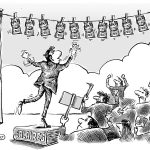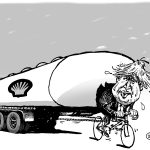Is trouble brewing at the ECB?
Christine Lagarde secured the consensus in the ranks of the ECB, but for how long?
Doing too much or not enough? The question resurfaced on the eve of the meeting of the Committee of Governors of the ECB. Did it die after its President’s press conference? The exercise, very well mastered, made it possible to respond to the concerns of the markets, without however putting an end to persistent controversies, both inside and outside the Institution.
Aware of the growing gap between the resumption of activity in the United States and the persistence of the constraints imposed by the pandemic in Europe, the ECB considers that the rise in prices could not justify any and premature turn of the monetary screw, quite the contrary. The widening of the spreads between American and European rates bears witness to this. It would not be possible to “pin” the American recovery on Europe. And yet.
Behind this quarrel arises again the question of the expansion of the missions of central banks.
With the rise in prices, the “hawks” and “doves” of the European Central Bank have once again flapped their wings. In the end, its President set out a rather clever compromise: yes, he ECB will accelerate the pace of asset purchases in the coming weeks; but the total amount of the program (1,800 billion euros by 2022) will not be increased for all that. On the side of the “hawks”, the rise in interest rates, far from being bad news, must accompany the recovery and keep inflation under control. For them, it would be high time to get out of negative rates. For the “doves”, the ECB must maintain its support intact and even be ready to step it up, in order to limit the rise in the cost of public debt, which could only kill the recovery in the bud. The pandemic emergency purchasing program (PEPP), implemented from the start of the confinements, did wonders to keep the yields on the public debts of the Member States at their lowest. But this is not without challenges and new complaints before the Constitutional Court in Karlsruhe. Although the German supreme court ability to rule in matters is itself the subject of controversy, given the role devolved to the European Court of Justice, its rulings do not go unnoticed. Last time, Karlsruhe had finally joined the previous ECB programs, acknowledging its framework of intervention – distribution keys, type of asset. Since the Covid crise, that framework has been widely expanded, giving new arguments to its detractors, who vilify a Central Bank exceeding its mandate and ruining savers.
Behind this quarrel, the question arises again – and therefore the legitimacy – of the expansion of the missions of the Central Banks, which goes back to the pre-Covid pandemic, which has has just amplified this trend.
Changing with the times should not be the alibi for negative setbacks.
So how can we not highlight the interdependence, if not the growing collusion with governments, pressed by the Central Bank itself to launch expenditure programs, and to free themselves from their budgetary discipline? Since last summer, the Federal Reserve, by easing its inflation target, has clearly changed its words and actions, with employment as an almost sole priority. The ECB has implicitly followed suit, while the Bank of Japan has long paved the way for “control of the curve”). However, these changes do not stop there: does the intention to acquire “green” bonds and thereby take an active part in the fight against climate change, risk encouraging inefficient spending drifts? Furthermore, how to reconcile the role of supervisor of the financial system,1 ? As the old say goes “He that too much embraceth, holds little”. The gradual extension of the ECB’s footprint, like its American and Japanese counterparts, as we have said, makes it a prisoner of its own actions. An unelected institution, will it end up serving as an excuse, if not a lightning rod for the State? In 2012, its contribution to the defense of the monetary unity of the euro zone was indisputable, which I personally find commendable, especially since it put into practice the agreement concluded between the member states of the euro zone. The counterpart of this action can be seen in the growing distance that is settling between the supporters of a return to the strict limits of its function, guarantor of the discipline of public policies, and the supporters of an increasingly assertive economic activism.
The fall in rates and access to accommodating financial conditions, as long as they last, now sharpen the ambitions and appetites of those who want to make this institution the arbiter of the economic cycle, and the permanent provider of its fuel. It is from its independence that its credibility was born. Changing with the times should not be the alibi for negative setbacks.
1 See the previous articles “The Central Bank trapped” https://vision-perspectives.com/economy/the-centralbank-is-trapped/, “Flooded with cash” https://vision-perspectives.com/economy/flooded-with-cash/
Valérie Plagnol – March 16, 2021 – Published in French in www.allnews.ch – Cartoon ©Barret



